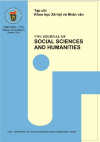Được thành lập ngày 31/8/2015 (giấy phép hoạt động số 155/GP-BTTTT ngày 11 tháng 5 năm 2015 của Bộ Thông tin và Truyền thông, mã số tiêu chuẩn quốc tế ISSN 2354-1172), Tạp chí Khoa học Xã hội và Nhân văn (Journal of Social Sciences and Humanities) là ấn phẩm khoa học chính thức, duy nhất của Trường Đại học Khoa học Xã hội và Nhân văn, ĐHQG Hà Nội, phát triển và kế thừa Chuyên san Khoa học Xã hội và Nhân văn, Tạp chí Khoa học, ĐHQG Hà Nội.
Tạp chí xuất bản định kỳ (04 số tiếng Việt/năm và 02 số tiếng Anh/năm), có nhiệm vụ công bố, giới thiệu các công trình nghiên cứu khoa học khoa học xã hội và nhân văn của các tác giả là các nhà khoa học trong và ngoài nước, phục vụ giảng dạy, học tập và nghiên cứu khoa học. Hội đồng biên tập của Tạp chí hiện bao gồm 35 nhà khoa học có uy tín trong nước và quốc tế. Tạp chí tập trung và ưu tiên đăng tải những bài báo theo định hướng của tinh thần cởi mở, sáng tạo, nhanh chóng vươn lên để tiếp cận và sánh ngang với các tạp chí có uy tín hàng đầu của khu vực và trên thế giới. Nội dung chính của Tạp chí bao gồm các Bài nghiên cứu (khoảng 6000 đến 15000 từ), các bài điểm sách, thông tin khoa học (khoảng 300 đến 1500 từ) được trình bày theo đúng cấu trúc và chuẩn mực của một tạp chí khoa học.
Các bài viết của Tạp chí hiện đang được trích dẫn bởi Google Scholar, WorldCat, Open Archives, Cosmos Impact Factor, Advanced Sciences Index, Scientific Indexing Services, CrossRef, EBSCO Information Services.
Mọi thông tin xin liên hệ: Phòng Tạp chí, 611 - E, Trường Đại học Khoa học Xã hội và Nhân văn, 336 Nguyễn Trãi, Thanh Xuân, Hà Nội. ĐT: 024.35581984; email: tckhxhnv@vnu.edu.vn hoặc tapchikhxhnv@gmail.com
